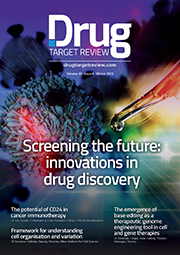Transforming translational research: CANscriptTM – A better predictive model for oncology
ABOUT THIS WEBINAR
In this webinar, speaker Mark Paris, PhD discussed a recent study evaluating a cohort of HNSCC patient tumours treated with anti-PD1 using CANscript™. He also be reviewed the results of this study as a means of investigating predictors of clinical response and identifying mechanisms of resistance.
Delineation of the intra-tumour microenvironment in a dynamic, spatio-temporal setting is critical for investigating the activity and efficacy of candidate oncology drugs. The majority of solid cancers contain unorganised, highly-complex microenvironment wherein a dysregulated phenotypic impacts treatment outcomes at a personalised level.
Biomarkers aren’t just supporting drug discovery – they’re driving it
FREE market report
From smarter trials to faster insights, this report unpacks the science, strategy and real-world impact behind the next generation of precision therapies.
What you’ll unlock:
- How biomarkers are guiding dose selection and early efficacy decisions in complex trials
- Why multi-omics, liquid biopsy and digital tools are redefining the discovery process
- What makes lab data regulatory-ready and why alignment matters from day one
Explore how biomarkers are shaping early drug development
Access the full report – it’s free!
We have developed and validated a fully human ex-vivo platform technology (CANscript™) using patient material (tumour, autologous ligands and immune cells) to explore the mechanism of and predict efficacy for clinically-directed compounds across several drug classes (Nat Comm., 6:6169:1-14 2015).
Drugs that modulate the immune system have been shown to be very effective in some patients. Tumour Infiltrating Lymphocytes are often required for the function of these drugs. In order to understand the role of functional immune phenotypes, we evaluated a cohort of HNSCC patient tumours treated with anti-PD1 using CANscript™.
This session reviewed results of this study as a means of investigating predictors of clinical response and identifying mechanisms of resistance.
The rest of this content is restricted - login or subscribe free to access


Why subscribe? Join our growing community of thousands of industry professionals and gain access to:
- quarterly issues in print and/or digital format
- case studies, whitepapers, webinars and industry-leading content
- breaking news and features
- our extensive online archive of thousands of articles and years of past issues
- ...And it's all free!
Click here to Subscribe today Login here
Related topics
Drug Discovery, Drug Discovery Processes, Ex Vivo, Molecular Biology, Molecular Targets, Oncology, Personalised Medicine, Precision Medicine, Research & Development, Translational Science
Related organisations
Mitra Biotech
Related people
Mark Paris









I am pleased to announce that the on demand version of this webinar is now available to watch. Should you have any feedback, please let us know in the comments below.